Case Study
VerifiedAdded on 2023/01/12
|10
|3761
|56
AI Summary
Contribute Materials
Your contribution can guide someone’s learning journey. Share your
documents today.

Case Study
1
1
Secure Best Marks with AI Grader
Need help grading? Try our AI Grader for instant feedback on your assignments.
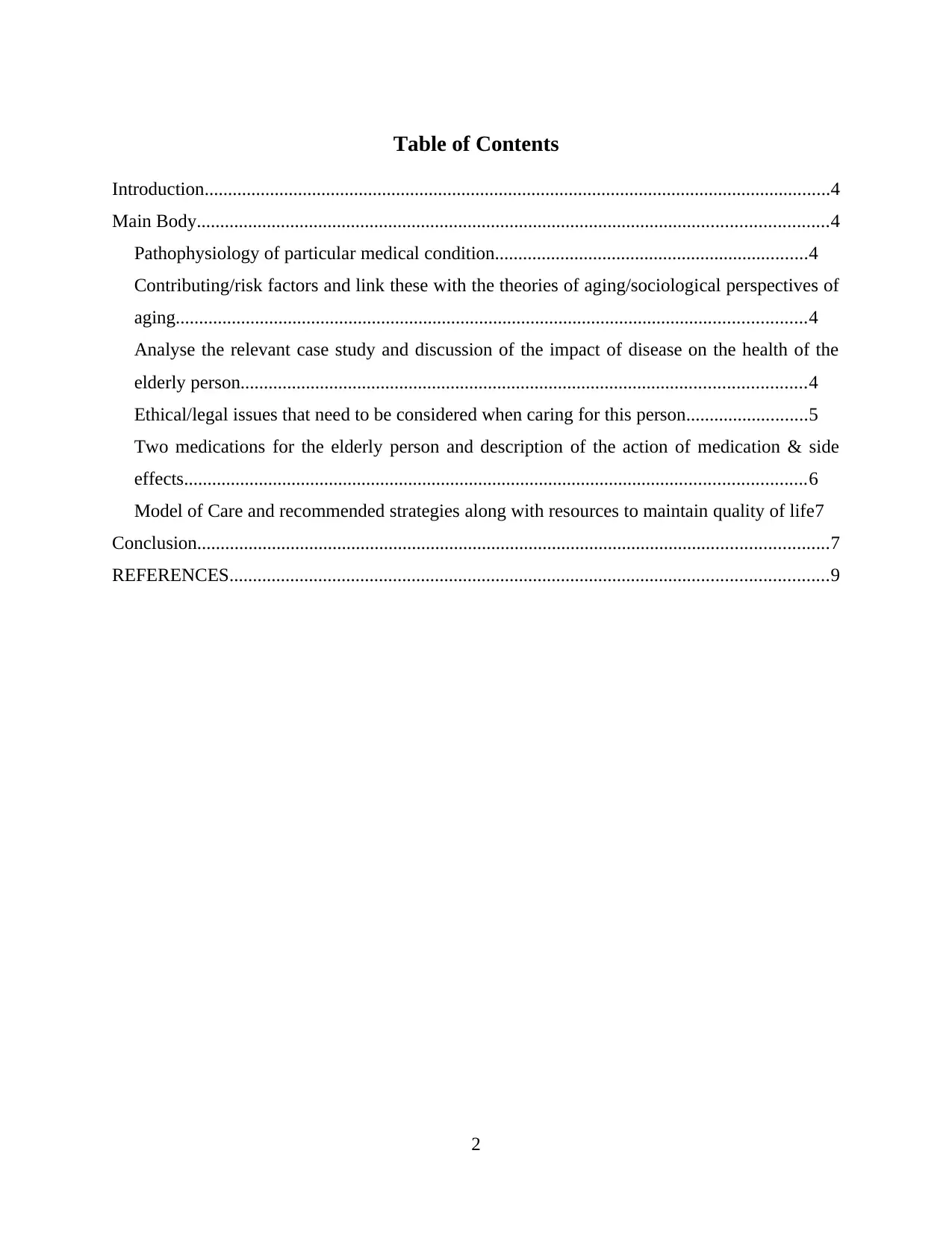
Table of Contents
Introduction......................................................................................................................................4
Main Body.......................................................................................................................................4
Pathophysiology of particular medical condition...................................................................4
Contributing/risk factors and link these with the theories of aging/sociological perspectives of
aging.......................................................................................................................................4
Analyse the relevant case study and discussion of the impact of disease on the health of the
elderly person.........................................................................................................................4
Ethical/legal issues that need to be considered when caring for this person..........................5
Two medications for the elderly person and description of the action of medication & side
effects.....................................................................................................................................6
Model of Care and recommended strategies along with resources to maintain quality of life7
Conclusion.......................................................................................................................................7
REFERENCES................................................................................................................................9
2
Introduction......................................................................................................................................4
Main Body.......................................................................................................................................4
Pathophysiology of particular medical condition...................................................................4
Contributing/risk factors and link these with the theories of aging/sociological perspectives of
aging.......................................................................................................................................4
Analyse the relevant case study and discussion of the impact of disease on the health of the
elderly person.........................................................................................................................4
Ethical/legal issues that need to be considered when caring for this person..........................5
Two medications for the elderly person and description of the action of medication & side
effects.....................................................................................................................................6
Model of Care and recommended strategies along with resources to maintain quality of life7
Conclusion.......................................................................................................................................7
REFERENCES................................................................................................................................9
2
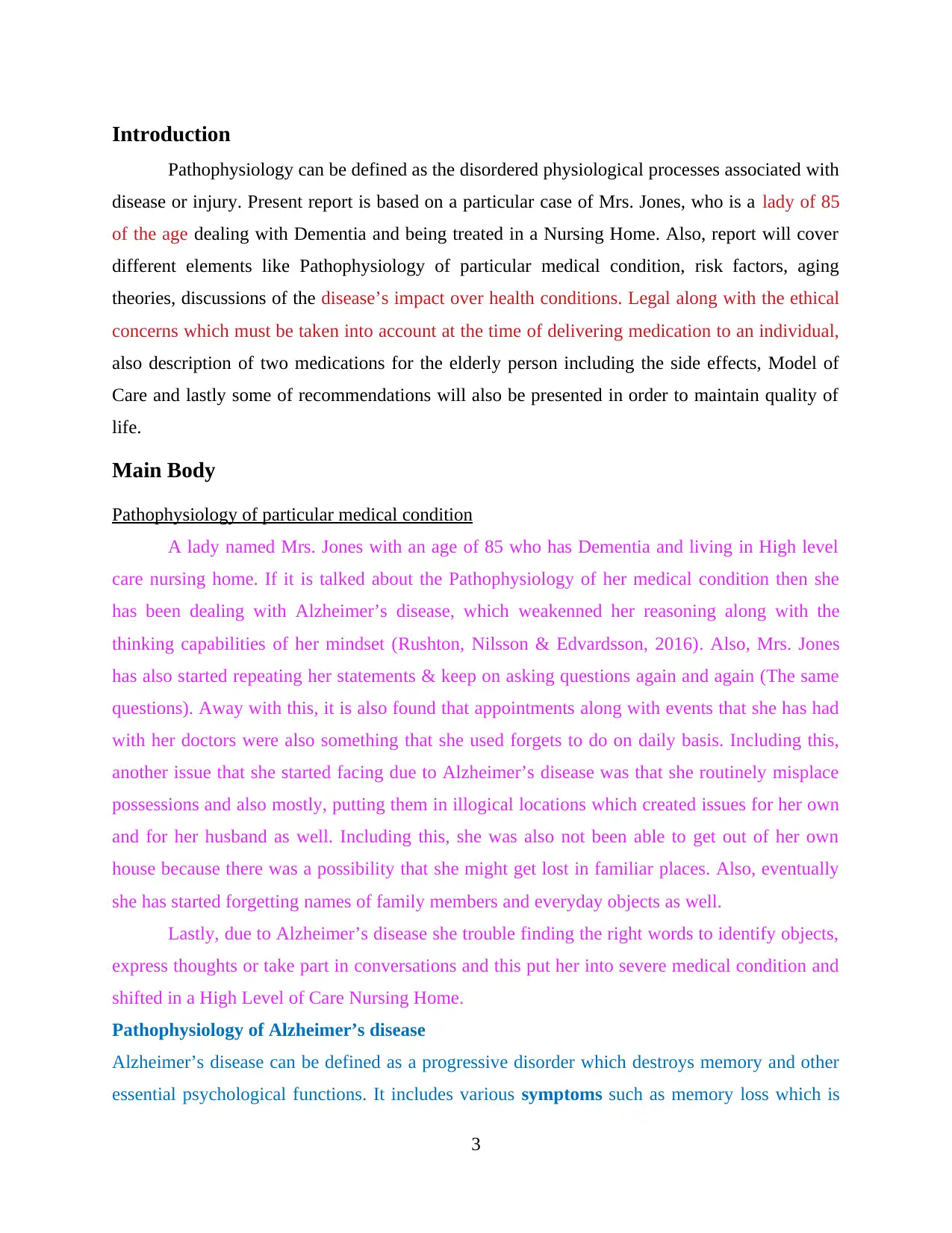
Introduction
Pathophysiology can be defined as the disordered physiological processes associated with
disease or injury. Present report is based on a particular case of Mrs. Jones, who is a lady of 85
of the age dealing with Dementia and being treated in a Nursing Home. Also, report will cover
different elements like Pathophysiology of particular medical condition, risk factors, aging
theories, discussions of the disease’s impact over health conditions. Legal along with the ethical
concerns which must be taken into account at the time of delivering medication to an individual,
also description of two medications for the elderly person including the side effects, Model of
Care and lastly some of recommendations will also be presented in order to maintain quality of
life.
Main Body
Pathophysiology of particular medical condition
A lady named Mrs. Jones with an age of 85 who has Dementia and living in High level
care nursing home. If it is talked about the Pathophysiology of her medical condition then she
has been dealing with Alzheimer’s disease, which weakenned her reasoning along with the
thinking capabilities of her mindset (Rushton, Nilsson & Edvardsson, 2016). Also, Mrs. Jones
has also started repeating her statements & keep on asking questions again and again (The same
questions). Away with this, it is also found that appointments along with events that she has had
with her doctors were also something that she used forgets to do on daily basis. Including this,
another issue that she started facing due to Alzheimer’s disease was that she routinely misplace
possessions and also mostly, putting them in illogical locations which created issues for her own
and for her husband as well. Including this, she was also not been able to get out of her own
house because there was a possibility that she might get lost in familiar places. Also, eventually
she has started forgetting names of family members and everyday objects as well.
Lastly, due to Alzheimer’s disease she trouble finding the right words to identify objects,
express thoughts or take part in conversations and this put her into severe medical condition and
shifted in a High Level of Care Nursing Home.
Pathophysiology of Alzheimer’s disease
Alzheimer’s disease can be defined as a progressive disorder which destroys memory and other
essential psychological functions. It includes various symptoms such as memory loss which is
3
Pathophysiology can be defined as the disordered physiological processes associated with
disease or injury. Present report is based on a particular case of Mrs. Jones, who is a lady of 85
of the age dealing with Dementia and being treated in a Nursing Home. Also, report will cover
different elements like Pathophysiology of particular medical condition, risk factors, aging
theories, discussions of the disease’s impact over health conditions. Legal along with the ethical
concerns which must be taken into account at the time of delivering medication to an individual,
also description of two medications for the elderly person including the side effects, Model of
Care and lastly some of recommendations will also be presented in order to maintain quality of
life.
Main Body
Pathophysiology of particular medical condition
A lady named Mrs. Jones with an age of 85 who has Dementia and living in High level
care nursing home. If it is talked about the Pathophysiology of her medical condition then she
has been dealing with Alzheimer’s disease, which weakenned her reasoning along with the
thinking capabilities of her mindset (Rushton, Nilsson & Edvardsson, 2016). Also, Mrs. Jones
has also started repeating her statements & keep on asking questions again and again (The same
questions). Away with this, it is also found that appointments along with events that she has had
with her doctors were also something that she used forgets to do on daily basis. Including this,
another issue that she started facing due to Alzheimer’s disease was that she routinely misplace
possessions and also mostly, putting them in illogical locations which created issues for her own
and for her husband as well. Including this, she was also not been able to get out of her own
house because there was a possibility that she might get lost in familiar places. Also, eventually
she has started forgetting names of family members and everyday objects as well.
Lastly, due to Alzheimer’s disease she trouble finding the right words to identify objects,
express thoughts or take part in conversations and this put her into severe medical condition and
shifted in a High Level of Care Nursing Home.
Pathophysiology of Alzheimer’s disease
Alzheimer’s disease can be defined as a progressive disorder which destroys memory and other
essential psychological functions. It includes various symptoms such as memory loss which is
3
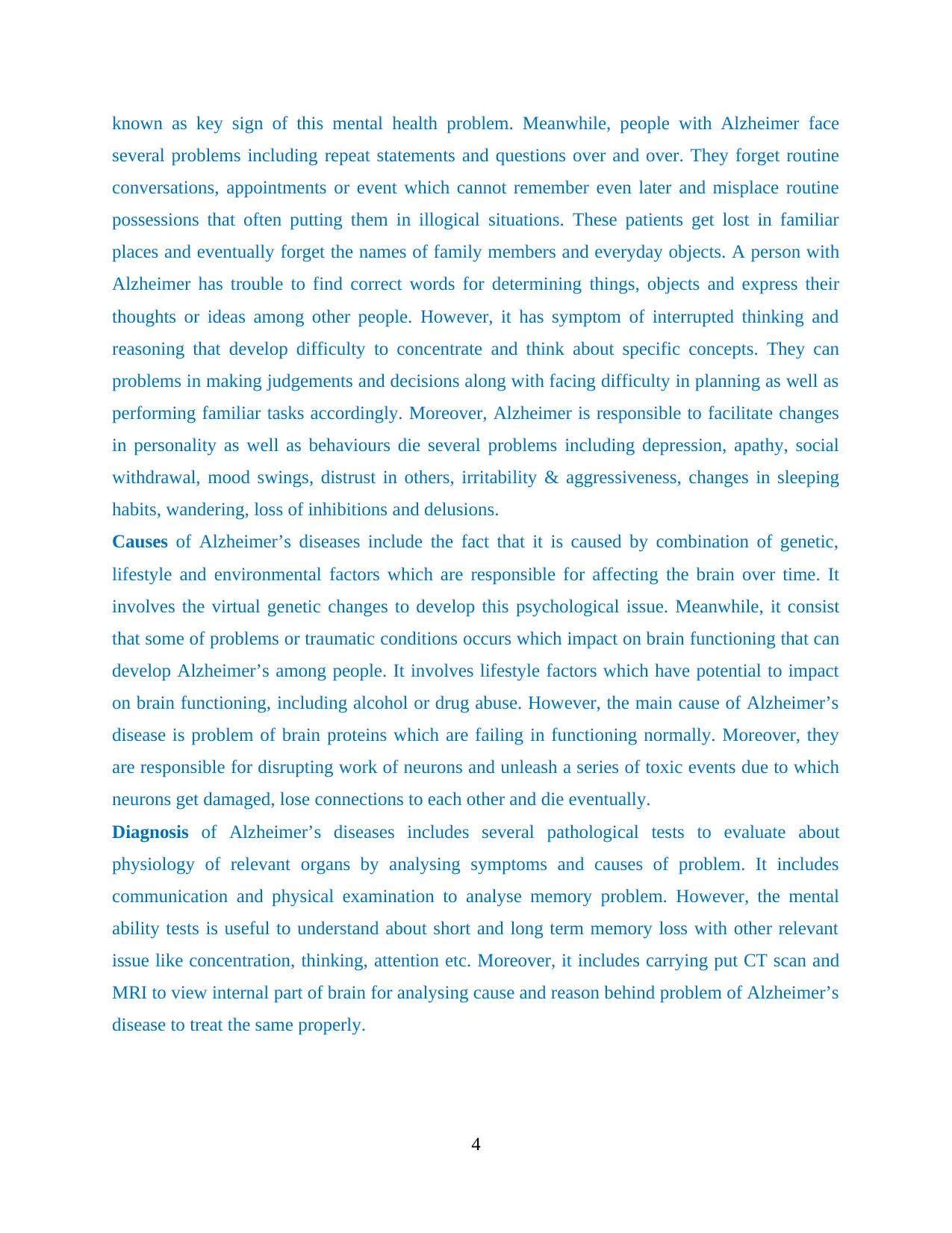
known as key sign of this mental health problem. Meanwhile, people with Alzheimer face
several problems including repeat statements and questions over and over. They forget routine
conversations, appointments or event which cannot remember even later and misplace routine
possessions that often putting them in illogical situations. These patients get lost in familiar
places and eventually forget the names of family members and everyday objects. A person with
Alzheimer has trouble to find correct words for determining things, objects and express their
thoughts or ideas among other people. However, it has symptom of interrupted thinking and
reasoning that develop difficulty to concentrate and think about specific concepts. They can
problems in making judgements and decisions along with facing difficulty in planning as well as
performing familiar tasks accordingly. Moreover, Alzheimer is responsible to facilitate changes
in personality as well as behaviours die several problems including depression, apathy, social
withdrawal, mood swings, distrust in others, irritability & aggressiveness, changes in sleeping
habits, wandering, loss of inhibitions and delusions.
Causes of Alzheimer’s diseases include the fact that it is caused by combination of genetic,
lifestyle and environmental factors which are responsible for affecting the brain over time. It
involves the virtual genetic changes to develop this psychological issue. Meanwhile, it consist
that some of problems or traumatic conditions occurs which impact on brain functioning that can
develop Alzheimer’s among people. It involves lifestyle factors which have potential to impact
on brain functioning, including alcohol or drug abuse. However, the main cause of Alzheimer’s
disease is problem of brain proteins which are failing in functioning normally. Moreover, they
are responsible for disrupting work of neurons and unleash a series of toxic events due to which
neurons get damaged, lose connections to each other and die eventually.
Diagnosis of Alzheimer’s diseases includes several pathological tests to evaluate about
physiology of relevant organs by analysing symptoms and causes of problem. It includes
communication and physical examination to analyse memory problem. However, the mental
ability tests is useful to understand about short and long term memory loss with other relevant
issue like concentration, thinking, attention etc. Moreover, it includes carrying put CT scan and
MRI to view internal part of brain for analysing cause and reason behind problem of Alzheimer’s
disease to treat the same properly.
4
several problems including repeat statements and questions over and over. They forget routine
conversations, appointments or event which cannot remember even later and misplace routine
possessions that often putting them in illogical situations. These patients get lost in familiar
places and eventually forget the names of family members and everyday objects. A person with
Alzheimer has trouble to find correct words for determining things, objects and express their
thoughts or ideas among other people. However, it has symptom of interrupted thinking and
reasoning that develop difficulty to concentrate and think about specific concepts. They can
problems in making judgements and decisions along with facing difficulty in planning as well as
performing familiar tasks accordingly. Moreover, Alzheimer is responsible to facilitate changes
in personality as well as behaviours die several problems including depression, apathy, social
withdrawal, mood swings, distrust in others, irritability & aggressiveness, changes in sleeping
habits, wandering, loss of inhibitions and delusions.
Causes of Alzheimer’s diseases include the fact that it is caused by combination of genetic,
lifestyle and environmental factors which are responsible for affecting the brain over time. It
involves the virtual genetic changes to develop this psychological issue. Meanwhile, it consist
that some of problems or traumatic conditions occurs which impact on brain functioning that can
develop Alzheimer’s among people. It involves lifestyle factors which have potential to impact
on brain functioning, including alcohol or drug abuse. However, the main cause of Alzheimer’s
disease is problem of brain proteins which are failing in functioning normally. Moreover, they
are responsible for disrupting work of neurons and unleash a series of toxic events due to which
neurons get damaged, lose connections to each other and die eventually.
Diagnosis of Alzheimer’s diseases includes several pathological tests to evaluate about
physiology of relevant organs by analysing symptoms and causes of problem. It includes
communication and physical examination to analyse memory problem. However, the mental
ability tests is useful to understand about short and long term memory loss with other relevant
issue like concentration, thinking, attention etc. Moreover, it includes carrying put CT scan and
MRI to view internal part of brain for analysing cause and reason behind problem of Alzheimer’s
disease to treat the same properly.
4
Secure Best Marks with AI Grader
Need help grading? Try our AI Grader for instant feedback on your assignments.
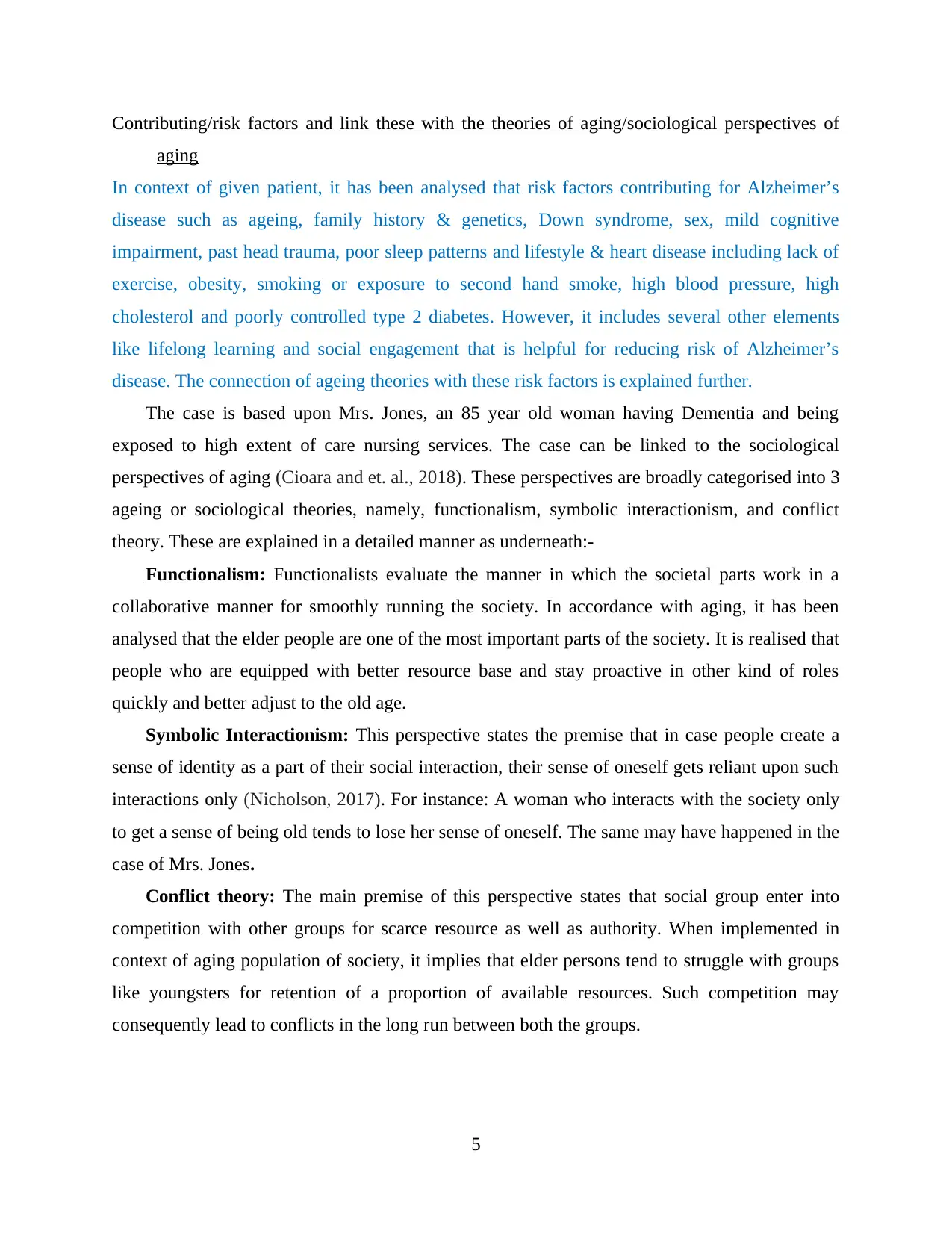
Contributing/risk factors and link these with the theories of aging/sociological perspectives of
aging
In context of given patient, it has been analysed that risk factors contributing for Alzheimer’s
disease such as ageing, family history & genetics, Down syndrome, sex, mild cognitive
impairment, past head trauma, poor sleep patterns and lifestyle & heart disease including lack of
exercise, obesity, smoking or exposure to second hand smoke, high blood pressure, high
cholesterol and poorly controlled type 2 diabetes. However, it includes several other elements
like lifelong learning and social engagement that is helpful for reducing risk of Alzheimer’s
disease. The connection of ageing theories with these risk factors is explained further.
The case is based upon Mrs. Jones, an 85 year old woman having Dementia and being
exposed to high extent of care nursing services. The case can be linked to the sociological
perspectives of aging (Cioara and et. al., 2018). These perspectives are broadly categorised into 3
ageing or sociological theories, namely, functionalism, symbolic interactionism, and conflict
theory. These are explained in a detailed manner as underneath:-
Functionalism: Functionalists evaluate the manner in which the societal parts work in a
collaborative manner for smoothly running the society. In accordance with aging, it has been
analysed that the elder people are one of the most important parts of the society. It is realised that
people who are equipped with better resource base and stay proactive in other kind of roles
quickly and better adjust to the old age.
Symbolic Interactionism: This perspective states the premise that in case people create a
sense of identity as a part of their social interaction, their sense of oneself gets reliant upon such
interactions only (Nicholson, 2017). For instance: A woman who interacts with the society only
to get a sense of being old tends to lose her sense of oneself. The same may have happened in the
case of Mrs. Jones.
Conflict theory: The main premise of this perspective states that social group enter into
competition with other groups for scarce resource as well as authority. When implemented in
context of aging population of society, it implies that elder persons tend to struggle with groups
like youngsters for retention of a proportion of available resources. Such competition may
consequently lead to conflicts in the long run between both the groups.
5
aging
In context of given patient, it has been analysed that risk factors contributing for Alzheimer’s
disease such as ageing, family history & genetics, Down syndrome, sex, mild cognitive
impairment, past head trauma, poor sleep patterns and lifestyle & heart disease including lack of
exercise, obesity, smoking or exposure to second hand smoke, high blood pressure, high
cholesterol and poorly controlled type 2 diabetes. However, it includes several other elements
like lifelong learning and social engagement that is helpful for reducing risk of Alzheimer’s
disease. The connection of ageing theories with these risk factors is explained further.
The case is based upon Mrs. Jones, an 85 year old woman having Dementia and being
exposed to high extent of care nursing services. The case can be linked to the sociological
perspectives of aging (Cioara and et. al., 2018). These perspectives are broadly categorised into 3
ageing or sociological theories, namely, functionalism, symbolic interactionism, and conflict
theory. These are explained in a detailed manner as underneath:-
Functionalism: Functionalists evaluate the manner in which the societal parts work in a
collaborative manner for smoothly running the society. In accordance with aging, it has been
analysed that the elder people are one of the most important parts of the society. It is realised that
people who are equipped with better resource base and stay proactive in other kind of roles
quickly and better adjust to the old age.
Symbolic Interactionism: This perspective states the premise that in case people create a
sense of identity as a part of their social interaction, their sense of oneself gets reliant upon such
interactions only (Nicholson, 2017). For instance: A woman who interacts with the society only
to get a sense of being old tends to lose her sense of oneself. The same may have happened in the
case of Mrs. Jones.
Conflict theory: The main premise of this perspective states that social group enter into
competition with other groups for scarce resource as well as authority. When implemented in
context of aging population of society, it implies that elder persons tend to struggle with groups
like youngsters for retention of a proportion of available resources. Such competition may
consequently lead to conflicts in the long run between both the groups.
5
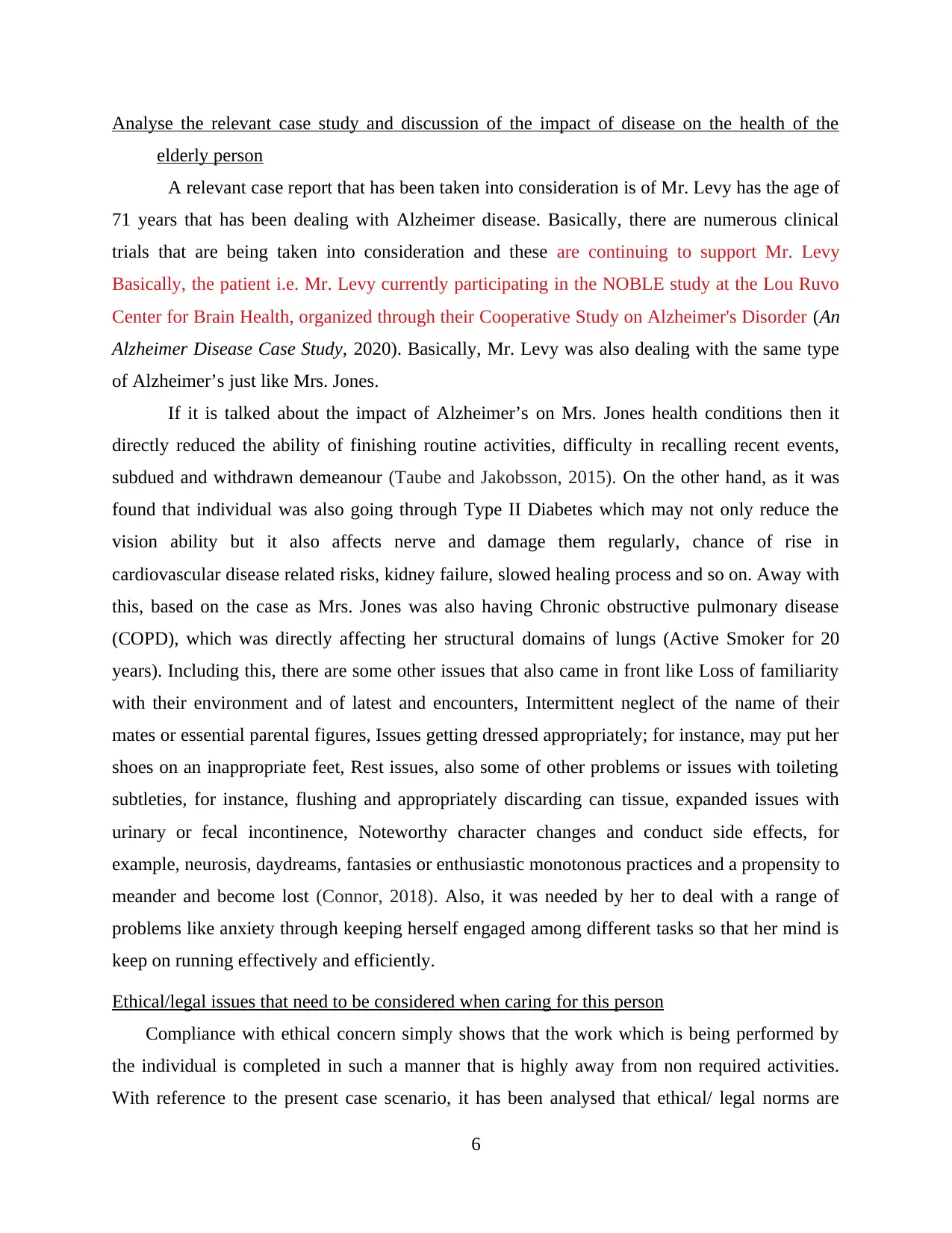
Analyse the relevant case study and discussion of the impact of disease on the health of the
elderly person
A relevant case report that has been taken into consideration is of Mr. Levy has the age of
71 years that has been dealing with Alzheimer disease. Basically, there are numerous clinical
trials that are being taken into consideration and these are continuing to support Mr. Levy
Basically, the patient i.e. Mr. Levy currently participating in the NOBLE study at the Lou Ruvo
Center for Brain Health, organized through their Cooperative Study on Alzheimer's Disorder (An
Alzheimer Disease Case Study, 2020). Basically, Mr. Levy was also dealing with the same type
of Alzheimer’s just like Mrs. Jones.
If it is talked about the impact of Alzheimer’s on Mrs. Jones health conditions then it
directly reduced the ability of finishing routine activities, difficulty in recalling recent events,
subdued and withdrawn demeanour (Taube and Jakobsson, 2015). On the other hand, as it was
found that individual was also going through Type II Diabetes which may not only reduce the
vision ability but it also affects nerve and damage them regularly, chance of rise in
cardiovascular disease related risks, kidney failure, slowed healing process and so on. Away with
this, based on the case as Mrs. Jones was also having Chronic obstructive pulmonary disease
(COPD), which was directly affecting her structural domains of lungs (Active Smoker for 20
years). Including this, there are some other issues that also came in front like Loss of familiarity
with their environment and of latest and encounters, Intermittent neglect of the name of their
mates or essential parental figures, Issues getting dressed appropriately; for instance, may put her
shoes on an inappropriate feet, Rest issues, also some of other problems or issues with toileting
subtleties, for instance, flushing and appropriately discarding can tissue, expanded issues with
urinary or fecal incontinence, Noteworthy character changes and conduct side effects, for
example, neurosis, daydreams, fantasies or enthusiastic monotonous practices and a propensity to
meander and become lost (Connor, 2018). Also, it was needed by her to deal with a range of
problems like anxiety through keeping herself engaged among different tasks so that her mind is
keep on running effectively and efficiently.
Ethical/legal issues that need to be considered when caring for this person
Compliance with ethical concern simply shows that the work which is being performed by
the individual is completed in such a manner that is highly away from non required activities.
With reference to the present case scenario, it has been analysed that ethical/ legal norms are
6
elderly person
A relevant case report that has been taken into consideration is of Mr. Levy has the age of
71 years that has been dealing with Alzheimer disease. Basically, there are numerous clinical
trials that are being taken into consideration and these are continuing to support Mr. Levy
Basically, the patient i.e. Mr. Levy currently participating in the NOBLE study at the Lou Ruvo
Center for Brain Health, organized through their Cooperative Study on Alzheimer's Disorder (An
Alzheimer Disease Case Study, 2020). Basically, Mr. Levy was also dealing with the same type
of Alzheimer’s just like Mrs. Jones.
If it is talked about the impact of Alzheimer’s on Mrs. Jones health conditions then it
directly reduced the ability of finishing routine activities, difficulty in recalling recent events,
subdued and withdrawn demeanour (Taube and Jakobsson, 2015). On the other hand, as it was
found that individual was also going through Type II Diabetes which may not only reduce the
vision ability but it also affects nerve and damage them regularly, chance of rise in
cardiovascular disease related risks, kidney failure, slowed healing process and so on. Away with
this, based on the case as Mrs. Jones was also having Chronic obstructive pulmonary disease
(COPD), which was directly affecting her structural domains of lungs (Active Smoker for 20
years). Including this, there are some other issues that also came in front like Loss of familiarity
with their environment and of latest and encounters, Intermittent neglect of the name of their
mates or essential parental figures, Issues getting dressed appropriately; for instance, may put her
shoes on an inappropriate feet, Rest issues, also some of other problems or issues with toileting
subtleties, for instance, flushing and appropriately discarding can tissue, expanded issues with
urinary or fecal incontinence, Noteworthy character changes and conduct side effects, for
example, neurosis, daydreams, fantasies or enthusiastic monotonous practices and a propensity to
meander and become lost (Connor, 2018). Also, it was needed by her to deal with a range of
problems like anxiety through keeping herself engaged among different tasks so that her mind is
keep on running effectively and efficiently.
Ethical/legal issues that need to be considered when caring for this person
Compliance with ethical concern simply shows that the work which is being performed by
the individual is completed in such a manner that is highly away from non required activities.
With reference to the present case scenario, it has been analysed that ethical/ legal norms are
6
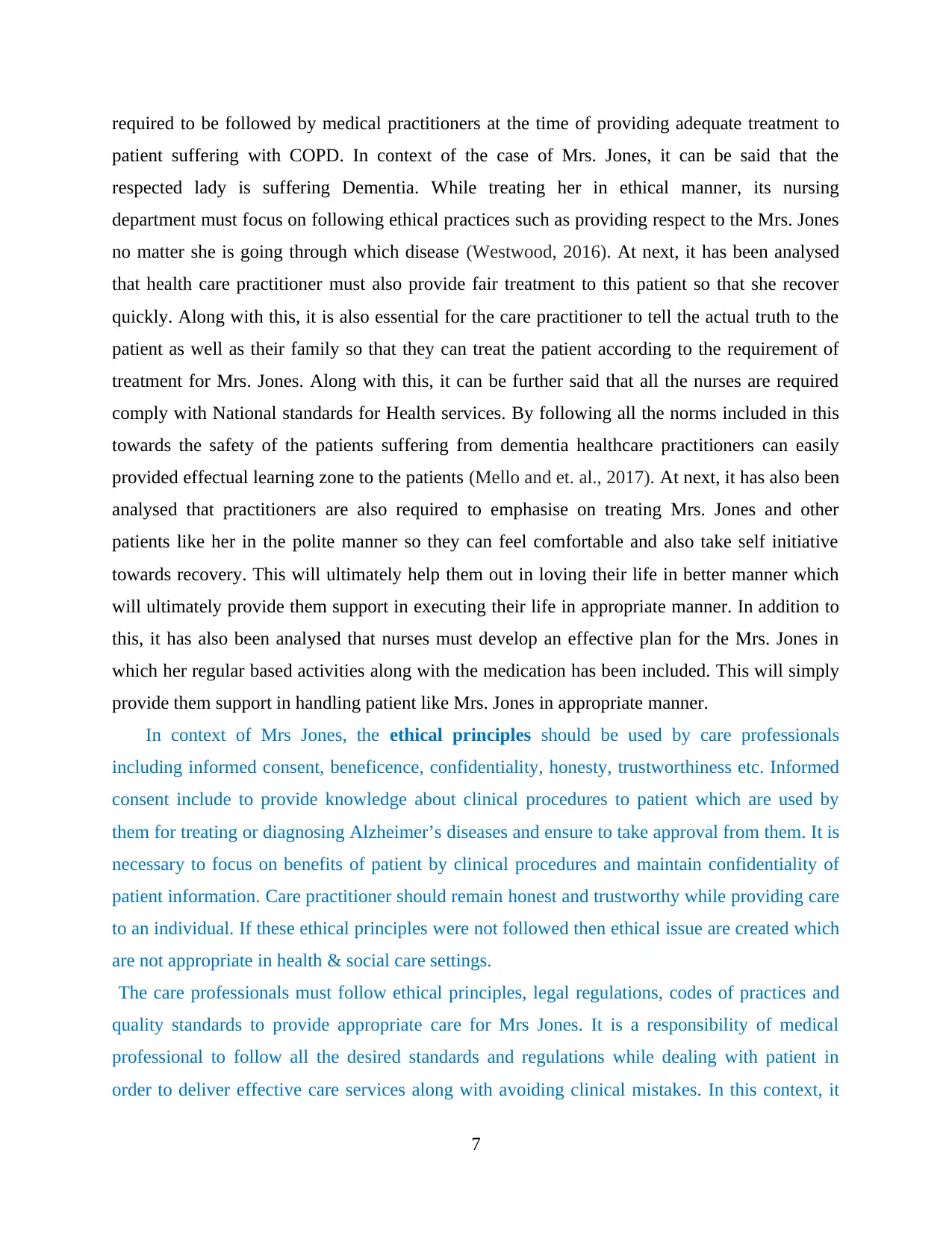
required to be followed by medical practitioners at the time of providing adequate treatment to
patient suffering with COPD. In context of the case of Mrs. Jones, it can be said that the
respected lady is suffering Dementia. While treating her in ethical manner, its nursing
department must focus on following ethical practices such as providing respect to the Mrs. Jones
no matter she is going through which disease (Westwood, 2016). At next, it has been analysed
that health care practitioner must also provide fair treatment to this patient so that she recover
quickly. Along with this, it is also essential for the care practitioner to tell the actual truth to the
patient as well as their family so that they can treat the patient according to the requirement of
treatment for Mrs. Jones. Along with this, it can be further said that all the nurses are required
comply with National standards for Health services. By following all the norms included in this
towards the safety of the patients suffering from dementia healthcare practitioners can easily
provided effectual learning zone to the patients (Mello and et. al., 2017). At next, it has also been
analysed that practitioners are also required to emphasise on treating Mrs. Jones and other
patients like her in the polite manner so they can feel comfortable and also take self initiative
towards recovery. This will ultimately help them out in loving their life in better manner which
will ultimately provide them support in executing their life in appropriate manner. In addition to
this, it has also been analysed that nurses must develop an effective plan for the Mrs. Jones in
which her regular based activities along with the medication has been included. This will simply
provide them support in handling patient like Mrs. Jones in appropriate manner.
In context of Mrs Jones, the ethical principles should be used by care professionals
including informed consent, beneficence, confidentiality, honesty, trustworthiness etc. Informed
consent include to provide knowledge about clinical procedures to patient which are used by
them for treating or diagnosing Alzheimer’s diseases and ensure to take approval from them. It is
necessary to focus on benefits of patient by clinical procedures and maintain confidentiality of
patient information. Care practitioner should remain honest and trustworthy while providing care
to an individual. If these ethical principles were not followed then ethical issue are created which
are not appropriate in health & social care settings.
The care professionals must follow ethical principles, legal regulations, codes of practices and
quality standards to provide appropriate care for Mrs Jones. It is a responsibility of medical
professional to follow all the desired standards and regulations while dealing with patient in
order to deliver effective care services along with avoiding clinical mistakes. In this context, it
7
patient suffering with COPD. In context of the case of Mrs. Jones, it can be said that the
respected lady is suffering Dementia. While treating her in ethical manner, its nursing
department must focus on following ethical practices such as providing respect to the Mrs. Jones
no matter she is going through which disease (Westwood, 2016). At next, it has been analysed
that health care practitioner must also provide fair treatment to this patient so that she recover
quickly. Along with this, it is also essential for the care practitioner to tell the actual truth to the
patient as well as their family so that they can treat the patient according to the requirement of
treatment for Mrs. Jones. Along with this, it can be further said that all the nurses are required
comply with National standards for Health services. By following all the norms included in this
towards the safety of the patients suffering from dementia healthcare practitioners can easily
provided effectual learning zone to the patients (Mello and et. al., 2017). At next, it has also been
analysed that practitioners are also required to emphasise on treating Mrs. Jones and other
patients like her in the polite manner so they can feel comfortable and also take self initiative
towards recovery. This will ultimately help them out in loving their life in better manner which
will ultimately provide them support in executing their life in appropriate manner. In addition to
this, it has also been analysed that nurses must develop an effective plan for the Mrs. Jones in
which her regular based activities along with the medication has been included. This will simply
provide them support in handling patient like Mrs. Jones in appropriate manner.
In context of Mrs Jones, the ethical principles should be used by care professionals
including informed consent, beneficence, confidentiality, honesty, trustworthiness etc. Informed
consent include to provide knowledge about clinical procedures to patient which are used by
them for treating or diagnosing Alzheimer’s diseases and ensure to take approval from them. It is
necessary to focus on benefits of patient by clinical procedures and maintain confidentiality of
patient information. Care practitioner should remain honest and trustworthy while providing care
to an individual. If these ethical principles were not followed then ethical issue are created which
are not appropriate in health & social care settings.
The care professionals must follow ethical principles, legal regulations, codes of practices and
quality standards to provide appropriate care for Mrs Jones. It is a responsibility of medical
professional to follow all the desired standards and regulations while dealing with patient in
order to deliver effective care services along with avoiding clinical mistakes. In this context, it
7
Paraphrase This Document
Need a fresh take? Get an instant paraphrase of this document with our AI Paraphraser
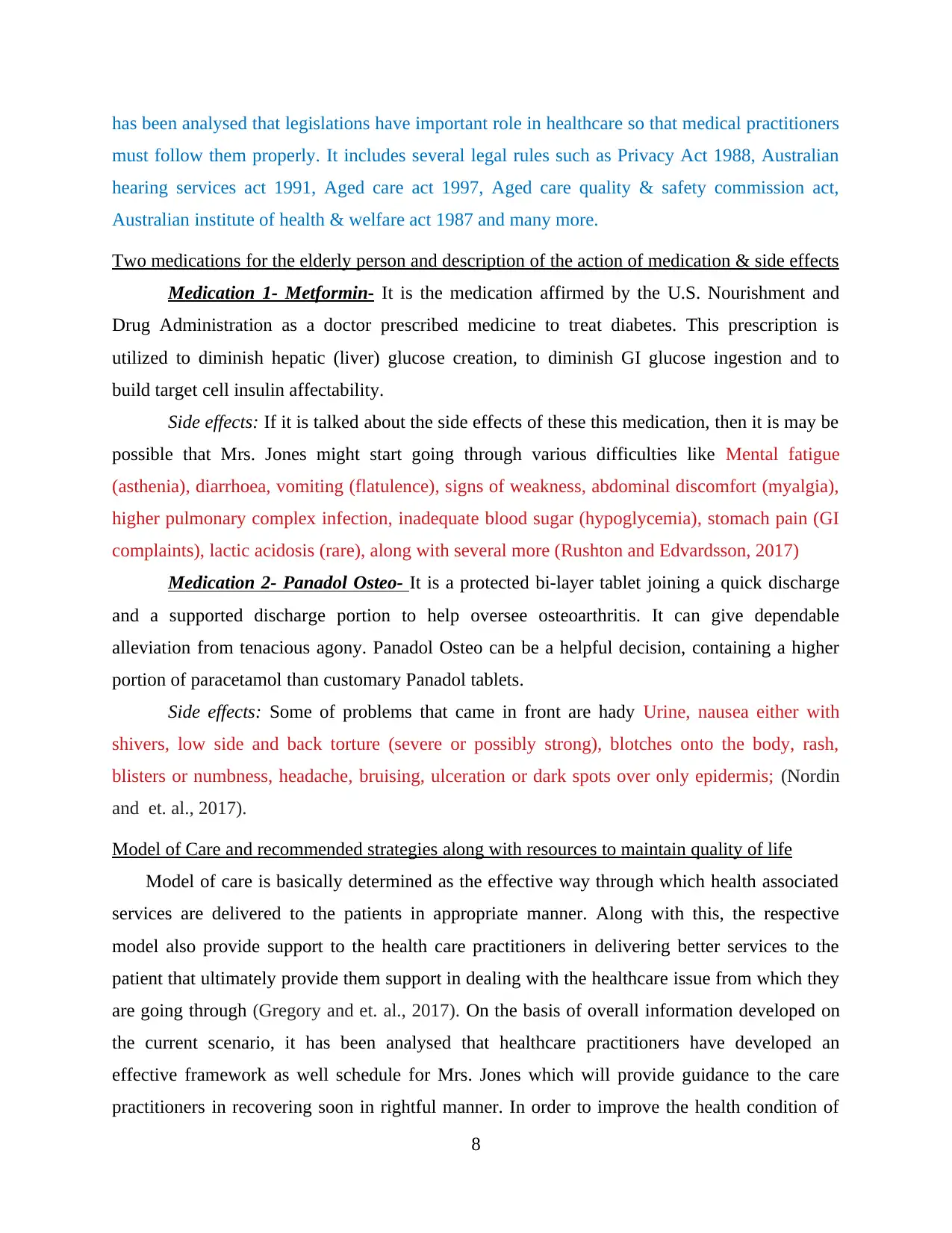
has been analysed that legislations have important role in healthcare so that medical practitioners
must follow them properly. It includes several legal rules such as Privacy Act 1988, Australian
hearing services act 1991, Aged care act 1997, Aged care quality & safety commission act,
Australian institute of health & welfare act 1987 and many more.
Two medications for the elderly person and description of the action of medication & side effects
Medication 1- Metformin- It is the medication affirmed by the U.S. Nourishment and
Drug Administration as a doctor prescribed medicine to treat diabetes. This prescription is
utilized to diminish hepatic (liver) glucose creation, to diminish GI glucose ingestion and to
build target cell insulin affectability.
Side effects: If it is talked about the side effects of these this medication, then it is may be
possible that Mrs. Jones might start going through various difficulties like Mental fatigue
(asthenia), diarrhoea, vomiting (flatulence), signs of weakness, abdominal discomfort (myalgia),
higher pulmonary complex infection, inadequate blood sugar (hypoglycemia), stomach pain (GI
complaints), lactic acidosis (rare), along with several more (Rushton and Edvardsson, 2017)
Medication 2- Panadol Osteo- It is a protected bi-layer tablet joining a quick discharge
and a supported discharge portion to help oversee osteoarthritis. It can give dependable
alleviation from tenacious agony. Panadol Osteo can be a helpful decision, containing a higher
portion of paracetamol than customary Panadol tablets.
Side effects: Some of problems that came in front are hady Urine, nausea either with
shivers, low side and back torture (severe or possibly strong), blotches onto the body, rash,
blisters or numbness, headache, bruising, ulceration or dark spots over only epidermis; (Nordin
and et. al., 2017).
Model of Care and recommended strategies along with resources to maintain quality of life
Model of care is basically determined as the effective way through which health associated
services are delivered to the patients in appropriate manner. Along with this, the respective
model also provide support to the health care practitioners in delivering better services to the
patient that ultimately provide them support in dealing with the healthcare issue from which they
are going through (Gregory and et. al., 2017). On the basis of overall information developed on
the current scenario, it has been analysed that healthcare practitioners have developed an
effective framework as well schedule for Mrs. Jones which will provide guidance to the care
practitioners in recovering soon in rightful manner. In order to improve the health condition of
8
must follow them properly. It includes several legal rules such as Privacy Act 1988, Australian
hearing services act 1991, Aged care act 1997, Aged care quality & safety commission act,
Australian institute of health & welfare act 1987 and many more.
Two medications for the elderly person and description of the action of medication & side effects
Medication 1- Metformin- It is the medication affirmed by the U.S. Nourishment and
Drug Administration as a doctor prescribed medicine to treat diabetes. This prescription is
utilized to diminish hepatic (liver) glucose creation, to diminish GI glucose ingestion and to
build target cell insulin affectability.
Side effects: If it is talked about the side effects of these this medication, then it is may be
possible that Mrs. Jones might start going through various difficulties like Mental fatigue
(asthenia), diarrhoea, vomiting (flatulence), signs of weakness, abdominal discomfort (myalgia),
higher pulmonary complex infection, inadequate blood sugar (hypoglycemia), stomach pain (GI
complaints), lactic acidosis (rare), along with several more (Rushton and Edvardsson, 2017)
Medication 2- Panadol Osteo- It is a protected bi-layer tablet joining a quick discharge
and a supported discharge portion to help oversee osteoarthritis. It can give dependable
alleviation from tenacious agony. Panadol Osteo can be a helpful decision, containing a higher
portion of paracetamol than customary Panadol tablets.
Side effects: Some of problems that came in front are hady Urine, nausea either with
shivers, low side and back torture (severe or possibly strong), blotches onto the body, rash,
blisters or numbness, headache, bruising, ulceration or dark spots over only epidermis; (Nordin
and et. al., 2017).
Model of Care and recommended strategies along with resources to maintain quality of life
Model of care is basically determined as the effective way through which health associated
services are delivered to the patients in appropriate manner. Along with this, the respective
model also provide support to the health care practitioners in delivering better services to the
patient that ultimately provide them support in dealing with the healthcare issue from which they
are going through (Gregory and et. al., 2017). On the basis of overall information developed on
the current scenario, it has been analysed that healthcare practitioners have developed an
effective framework as well schedule for Mrs. Jones which will provide guidance to the care
practitioners in recovering soon in rightful manner. In order to improve the health condition of
8
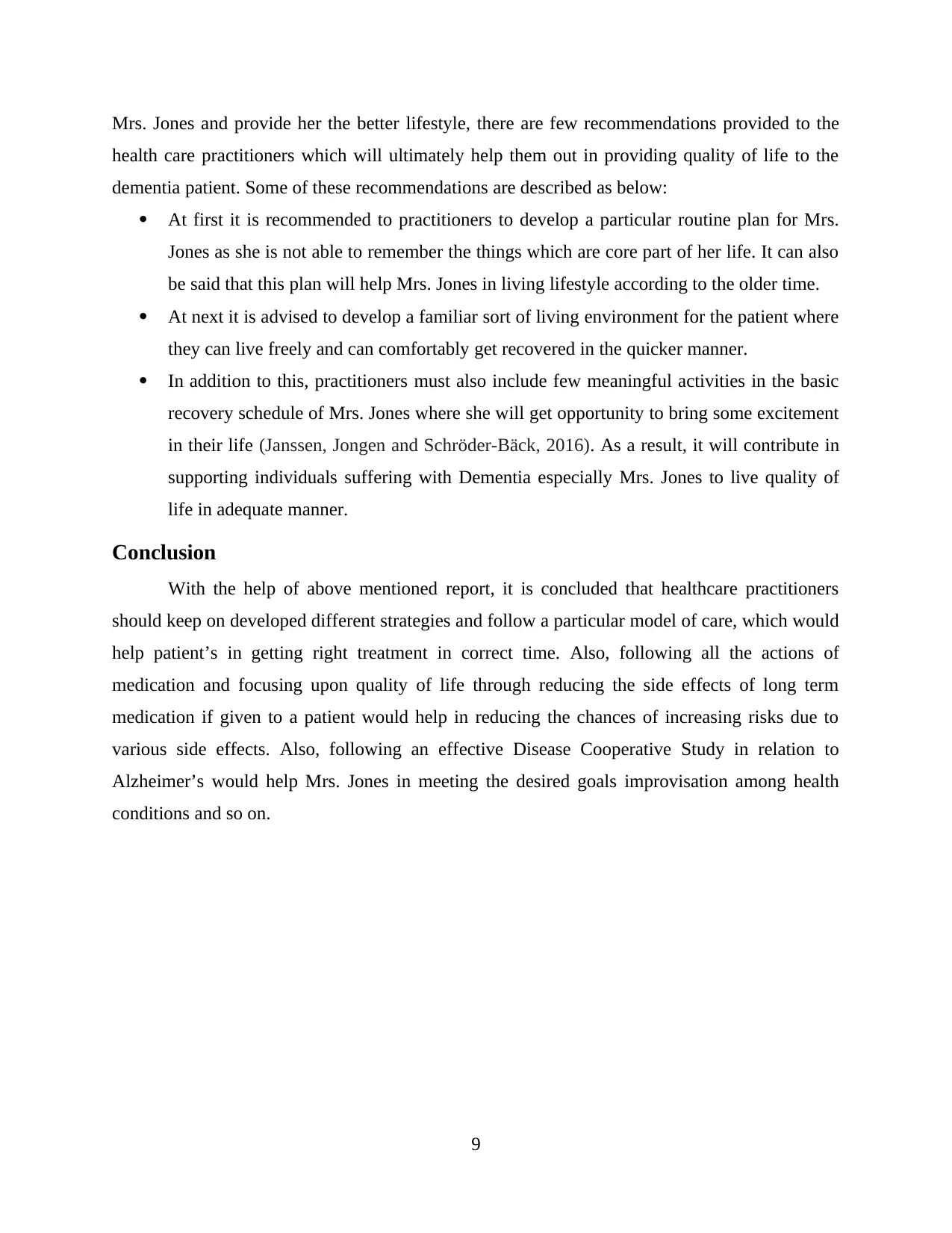
Mrs. Jones and provide her the better lifestyle, there are few recommendations provided to the
health care practitioners which will ultimately help them out in providing quality of life to the
dementia patient. Some of these recommendations are described as below:
At first it is recommended to practitioners to develop a particular routine plan for Mrs.
Jones as she is not able to remember the things which are core part of her life. It can also
be said that this plan will help Mrs. Jones in living lifestyle according to the older time.
At next it is advised to develop a familiar sort of living environment for the patient where
they can live freely and can comfortably get recovered in the quicker manner.
In addition to this, practitioners must also include few meaningful activities in the basic
recovery schedule of Mrs. Jones where she will get opportunity to bring some excitement
in their life (Janssen, Jongen and Schröder-Bäck, 2016). As a result, it will contribute in
supporting individuals suffering with Dementia especially Mrs. Jones to live quality of
life in adequate manner.
Conclusion
With the help of above mentioned report, it is concluded that healthcare practitioners
should keep on developed different strategies and follow a particular model of care, which would
help patient’s in getting right treatment in correct time. Also, following all the actions of
medication and focusing upon quality of life through reducing the side effects of long term
medication if given to a patient would help in reducing the chances of increasing risks due to
various side effects. Also, following an effective Disease Cooperative Study in relation to
Alzheimer’s would help Mrs. Jones in meeting the desired goals improvisation among health
conditions and so on.
9
health care practitioners which will ultimately help them out in providing quality of life to the
dementia patient. Some of these recommendations are described as below:
At first it is recommended to practitioners to develop a particular routine plan for Mrs.
Jones as she is not able to remember the things which are core part of her life. It can also
be said that this plan will help Mrs. Jones in living lifestyle according to the older time.
At next it is advised to develop a familiar sort of living environment for the patient where
they can live freely and can comfortably get recovered in the quicker manner.
In addition to this, practitioners must also include few meaningful activities in the basic
recovery schedule of Mrs. Jones where she will get opportunity to bring some excitement
in their life (Janssen, Jongen and Schröder-Bäck, 2016). As a result, it will contribute in
supporting individuals suffering with Dementia especially Mrs. Jones to live quality of
life in adequate manner.
Conclusion
With the help of above mentioned report, it is concluded that healthcare practitioners
should keep on developed different strategies and follow a particular model of care, which would
help patient’s in getting right treatment in correct time. Also, following all the actions of
medication and focusing upon quality of life through reducing the side effects of long term
medication if given to a patient would help in reducing the chances of increasing risks due to
various side effects. Also, following an effective Disease Cooperative Study in relation to
Alzheimer’s would help Mrs. Jones in meeting the desired goals improvisation among health
conditions and so on.
9
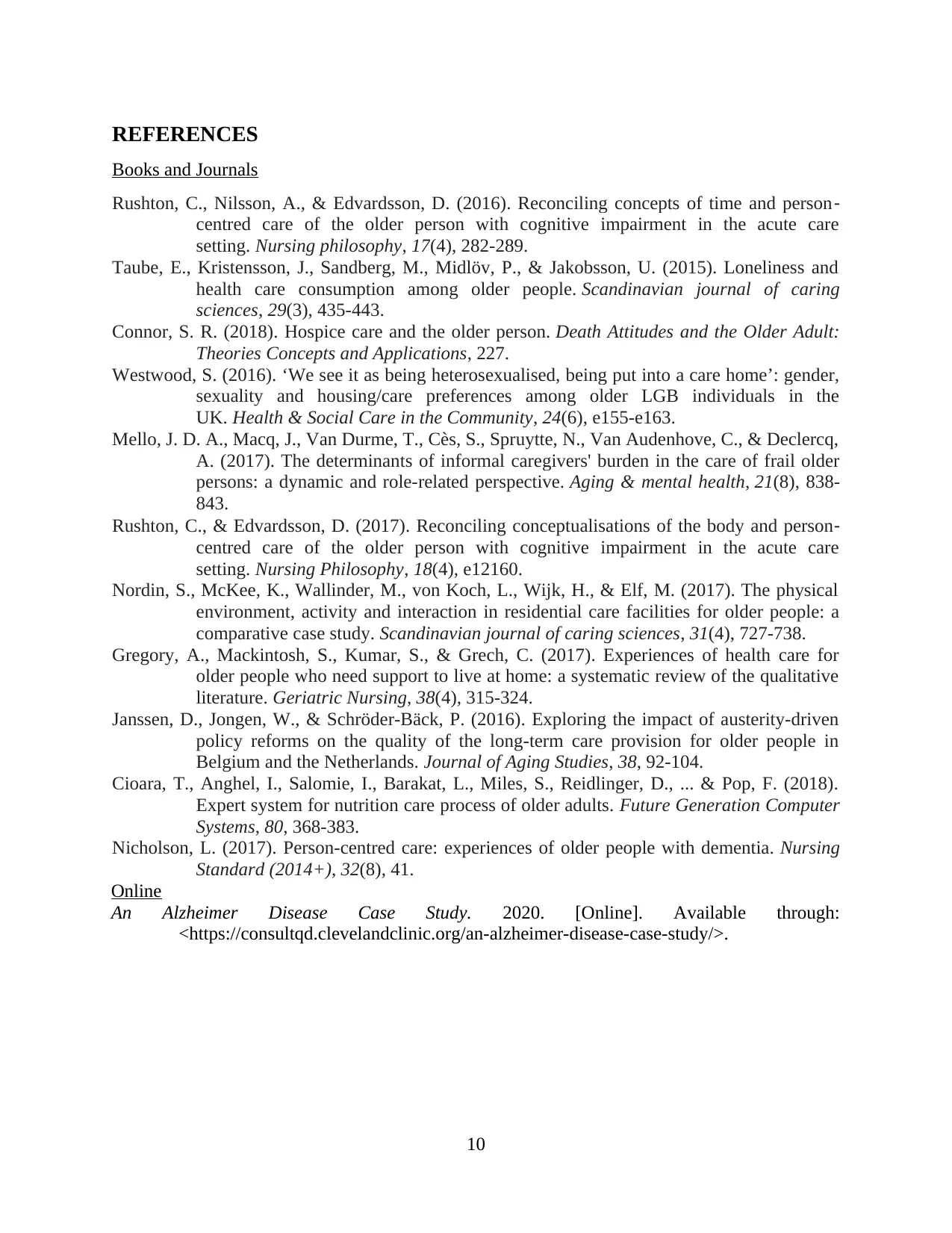
REFERENCES
Books and Journals
Rushton, C., Nilsson, A., & Edvardsson, D. (2016). Reconciling concepts of time and person‐
centred care of the older person with cognitive impairment in the acute care
setting. Nursing philosophy, 17(4), 282-289.
Taube, E., Kristensson, J., Sandberg, M., Midlöv, P., & Jakobsson, U. (2015). Loneliness and
health care consumption among older people. Scandinavian journal of caring
sciences, 29(3), 435-443.
Connor, S. R. (2018). Hospice care and the older person. Death Attitudes and the Older Adult:
Theories Concepts and Applications, 227.
Westwood, S. (2016). ‘We see it as being heterosexualised, being put into a care home’: gender,
sexuality and housing/care preferences among older LGB individuals in the
UK. Health & Social Care in the Community, 24(6), e155-e163.
Mello, J. D. A., Macq, J., Van Durme, T., Cès, S., Spruytte, N., Van Audenhove, C., & Declercq,
A. (2017). The determinants of informal caregivers' burden in the care of frail older
persons: a dynamic and role-related perspective. Aging & mental health, 21(8), 838-
843.
Rushton, C., & Edvardsson, D. (2017). Reconciling conceptualisations of the body and person‐
centred care of the older person with cognitive impairment in the acute care
setting. Nursing Philosophy, 18(4), e12160.
Nordin, S., McKee, K., Wallinder, M., von Koch, L., Wijk, H., & Elf, M. (2017). The physical
environment, activity and interaction in residential care facilities for older people: a
comparative case study. Scandinavian journal of caring sciences, 31(4), 727-738.
Gregory, A., Mackintosh, S., Kumar, S., & Grech, C. (2017). Experiences of health care for
older people who need support to live at home: a systematic review of the qualitative
literature. Geriatric Nursing, 38(4), 315-324.
Janssen, D., Jongen, W., & Schröder-Bäck, P. (2016). Exploring the impact of austerity-driven
policy reforms on the quality of the long-term care provision for older people in
Belgium and the Netherlands. Journal of Aging Studies, 38, 92-104.
Cioara, T., Anghel, I., Salomie, I., Barakat, L., Miles, S., Reidlinger, D., ... & Pop, F. (2018).
Expert system for nutrition care process of older adults. Future Generation Computer
Systems, 80, 368-383.
Nicholson, L. (2017). Person-centred care: experiences of older people with dementia. Nursing
Standard (2014+), 32(8), 41.
Online
An Alzheimer Disease Case Study. 2020. [Online]. Available through:
<https://consultqd.clevelandclinic.org/an-alzheimer-disease-case-study/>.
10
Books and Journals
Rushton, C., Nilsson, A., & Edvardsson, D. (2016). Reconciling concepts of time and person‐
centred care of the older person with cognitive impairment in the acute care
setting. Nursing philosophy, 17(4), 282-289.
Taube, E., Kristensson, J., Sandberg, M., Midlöv, P., & Jakobsson, U. (2015). Loneliness and
health care consumption among older people. Scandinavian journal of caring
sciences, 29(3), 435-443.
Connor, S. R. (2018). Hospice care and the older person. Death Attitudes and the Older Adult:
Theories Concepts and Applications, 227.
Westwood, S. (2016). ‘We see it as being heterosexualised, being put into a care home’: gender,
sexuality and housing/care preferences among older LGB individuals in the
UK. Health & Social Care in the Community, 24(6), e155-e163.
Mello, J. D. A., Macq, J., Van Durme, T., Cès, S., Spruytte, N., Van Audenhove, C., & Declercq,
A. (2017). The determinants of informal caregivers' burden in the care of frail older
persons: a dynamic and role-related perspective. Aging & mental health, 21(8), 838-
843.
Rushton, C., & Edvardsson, D. (2017). Reconciling conceptualisations of the body and person‐
centred care of the older person with cognitive impairment in the acute care
setting. Nursing Philosophy, 18(4), e12160.
Nordin, S., McKee, K., Wallinder, M., von Koch, L., Wijk, H., & Elf, M. (2017). The physical
environment, activity and interaction in residential care facilities for older people: a
comparative case study. Scandinavian journal of caring sciences, 31(4), 727-738.
Gregory, A., Mackintosh, S., Kumar, S., & Grech, C. (2017). Experiences of health care for
older people who need support to live at home: a systematic review of the qualitative
literature. Geriatric Nursing, 38(4), 315-324.
Janssen, D., Jongen, W., & Schröder-Bäck, P. (2016). Exploring the impact of austerity-driven
policy reforms on the quality of the long-term care provision for older people in
Belgium and the Netherlands. Journal of Aging Studies, 38, 92-104.
Cioara, T., Anghel, I., Salomie, I., Barakat, L., Miles, S., Reidlinger, D., ... & Pop, F. (2018).
Expert system for nutrition care process of older adults. Future Generation Computer
Systems, 80, 368-383.
Nicholson, L. (2017). Person-centred care: experiences of older people with dementia. Nursing
Standard (2014+), 32(8), 41.
Online
An Alzheimer Disease Case Study. 2020. [Online]. Available through:
<https://consultqd.clevelandclinic.org/an-alzheimer-disease-case-study/>.
10
1 out of 10
Related Documents
Your All-in-One AI-Powered Toolkit for Academic Success.
+13062052269
info@desklib.com
Available 24*7 on WhatsApp / Email
![[object Object]](/_next/static/media/star-bottom.7253800d.svg)
Unlock your academic potential
© 2024 | Zucol Services PVT LTD | All rights reserved.




